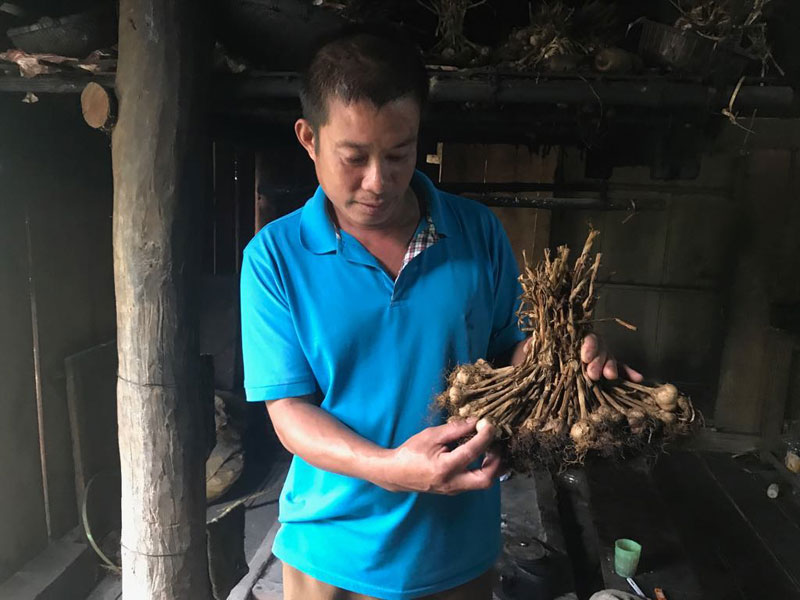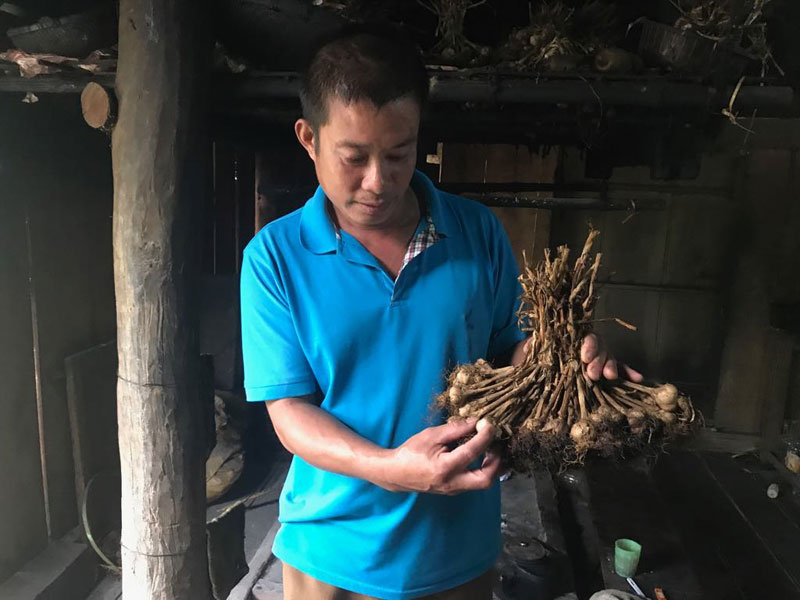
(HBO) – Each year, once the busy harvest season ends, farmers in Pu Bin commune of Mai Chau district, Hoa Binh province, start preparations to plant purple garlic. Making use of the cool mountainous climate, local residents have expanded the garlic planting area to raise their income.
Ha Cong Tin, a resident in
Na Phat hamlet of Pu Bin commune (Mai Chau district), stores dried garlic to
wait for prices to become more stable before selling the produce.
Purple garlic has a special taste and is also a
valuable herb curing many illnesses. Additionally, it suits local climate, so
residents in Pu Bin commune are farming this cash crop on a larger area.
The cultivation area reached 17ha in late 2017,
and it is expected to rise to 20ha this year and to continue to expanding in
the coming years. Na Phat and Bin communes have the largest garlic farming
area, over 10ha in total.
Ha Cong Tin, who has the largest garlic
cultivation area in Na Phat hamlet, said each year, after the harvest season,
his family will start to prepare soil for planting garlic. Last year, they
farmed 1,500 sq.m. of garlic and expanded the area to 2,000 sq.m. this year.
Garlic is easy to be cultivated and not vulnerable to diseases. Farming
techniques are simple as the plant needs little water and suits the local
climate, so it always grows well. He harvested nearly 400kg of garlic in last
year’s crop.
All households in Pu Bin commune have cultivated
garlic so far, from 40 sq.m. to 2,000 sq.m. each. Among them, Ha Cong Tin in Na
Phat hamlet plant 2,000 sq.m. of garlic while Dinh Cong Thang, a resident in
Bin hamlet, farms 1,800 sq.m.
Purple garlic of Mai Chau is favoured by
consumers thanks to its special good taste compared to other types of garlic in
the market. However, the sale of the local specialty remains unstable.
Kha Van Huong, head of Na Phat hamlet, said they
always meet difficulties in selling garlic. Because local residents live in a
mountainous region far away from urban areas, they have to bring garlic to
markets even before the dawn breaks and go back after the twilight, yet they
can sell only several kilogrammes of garlic.
If people fail to sell all garlic they bring
along, they can hang the produce above stoves to preserve and wait for higher
prices. However, garlic can only be stored for a short period of time as it may
sprout or become mouldy. If traders come to buy garlic at gardens, prices may
reach up to 50,000 VND (2.14 USD) per kg or drop to 15,000 – 20,000 VND (0.64 –
0.86 USD) per kg, Huong noted.
According to data from the Hoa Binh Provincial Party Committee, the industrial production index for the first six months of 2025 is estimated to have increased by 20% compared to the same period last year. This marks the highest year-on-year growth rate for this period since 2020.
In the first six months of 2025, Hoa Binh province’s export turnover was estimated at 1.145 billion USD, marking an 18.11% increase compared to the same period in 2024. Import turnover was estimated at $ 804 million, a 17.15% increase, which helped the province maintain a positive trade balance.
The lives of the ethnic minority farmers in Tan Lac district have gradually improved thanks to the new directions in agricultural production. This is a testament to the collective strength fostered through the professional associations and groups implemented by various levels of the district’s Farmers’ Union.
With the motto the "product quality comes first,” after nearly one year of establishment and operation, Muong village’s Clean Food Agricultural and Commercial Cooperative, located in Cau Hamlet, Hung Son Commune (Kim Boi district), has launched reputable, high-quality agricultural products to the market that are well-received by consumers. The products such as Muong village’s pork sausage, salt-cured chicken, and salt-cured pork hocks have gradually carved out a place in the market and they are on the path to obtaining the OCOP certification.
In the past, the phrase "bumper harvest, rock-bottom prices" was a familiar refrain for Vietnamese farmers engaged in fragmented, small-scale agriculture. But today, a new spirit is emerging across rural areas of Hoa Binh province - one of collaboration, organisation, and collective economic models that provide a stable foundation for production.
Maintaining growing area codes and packing facility codes in accordance with regulations is a mandatory requirement for agricultural products to be eligible for export. Recently, the Department of Agriculture and Environment of Hoa Binh province has intensified technical supervision of designated farming areas and packing facilities to safeguard the "green passport" that enables its products to access international markets.



